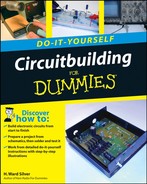This chapter contains ten bits of wisdom that you might get from a circuit-building mentor — the kind of guidance that isn't about a specific technique, but generally applies to everything. In fact, these are good guidelines for many hobbies and crafts. They help make and keep circuitbuilding an enjoyable activity that will keep on being enjoyable for years and years.
Take your time at the workbench — it's not a race! After a long session bent over the soldering iron, take a walk to clear your head and loosen your muscles. When you're troubleshooting and starting to get a little frustrated, that's the time to take a break. Many a project has been ruined or delayed because of working in a hurry or past the point of being alert.
Buy the best quality tools you can afford. Some of the author's tools have been with him for almost 40 years! Keep them clean and dry, don't abuse them, and store them in a good tool chest or carrying case. Beware of "grocery-store specials!" A high-quality tool will get the job done better and faster, plus it won't wear out as quickly.
It's important to be able to see what you're doing! Particularly when working on surface-mount electronics or other miniaturized circuits, good lighting can mean the difference between success and failure. A swing-arm lamp with a high-intensity bulb can put brilliant light exactly where it's needed. A head-mounted LED lamp will also do the job.
Look around the shop of a long-time circuitbuilder and you will probably see a handful of books on a shelf near the workbench — usually a mix of old and new, with the old ones somewhat dog-eared and well-used. Ask why those books are kept handy. You'll need a parts and tool catalog or two (those from the vendors listed in Appendix A are great to have), a couple of design cookbooks (one for analog circuits and one for digital), and handbooks covering your interests. When you find a good one — hang on to it!
Here's one of the best-kept secrets — the junk box full of spare, castoff, and reused items. Entire projects can be built from a well-stocked junk box! Start with one for mechanical hardware (screws, nuts, springs, and so on) and another for electronic parts (transistors, resistors, knobs, and so on). Save the conductive foam and bags that your parts are shipped in; you can use them in your junk box, too!
Get to know other local circuitbuilders. They can be invaluable sources of information and parts. Troubleshooting can also go a lot smoother with a friend around to ask the questions you didn't think of. Have an open house and learn from each other. Attend local flea markets or conventions together. Keep on the lookout for ham radio, computer, and antique radio flea markets — these are usually treasure troves of electronic bargains. The whole will definitely be greater than the sum of the parts!
As you build a project, stop as you complete sections of circuitry to perform simple checks. Did power get connected to everything it should and nothing it shouldn't? Does the amplifier amplify? Does the filter filter? Does the switch switch? These are much easier to test before the entire circuit or system is built. After everything is put together, any bugs in the finished product can be devilishly hard to isolate, so find as many as you can when things are simple.
Memory being what it is — that is, deficient — workbench and product notebooks can be worth their weight in gold. No, even more! If you wire up a control cable, be sure to write down the color of the wire for each terminal. If you get a new project working, be sure to write down any measurements you made of how it performed. Later on, it will be really nice to be able to go back and compare measurements. Just a spiral-bound notebook of lined paper is fine. Note the date for each entry so you can find them later.
As you learn more and more, take the time to pass that information along to others. If you've become experienced, share what you've learned with demonstrations at a club meeting or other gathering. It doesn't matter if you're not a polished public speaker, just lay out your gear, give a little explanation, and let the questioners lead the conversation. And take the time to help a newbie over the same bumps and obstacles you encountered!
Last, but not least, take pride in the craft of your workmanship! Not all projects need to be works of art, but paying attention to detail and appearance often pays benefits of fewer failures and easier maintenance. Plus, you'll swell with pride when somebody looks over your work and says, "Nice job!"
